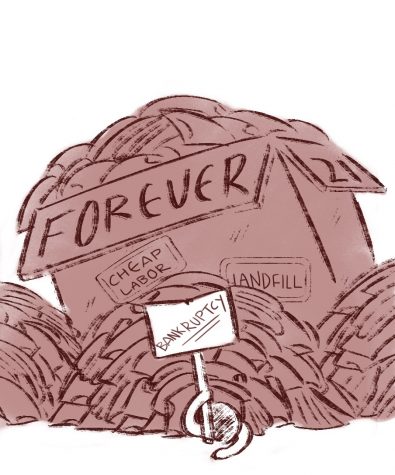Forever 21 should close forever
October 9, 2019

Have you ever wondered how Forever 21 is able to sell a tank top for only five dollars? The cheap prices may be beneficial to our bank accounts, but are only possible because the brand pays its workers as little as four dollars per hour. Aside from the underpayment of the brand’s workers, their mass production of clothing is also destructive to our environment. Many of us look to get the cheapest prices of clothing, but Forever 21’s tactics are not worth the consequences that the workers and the planet are taking from it.
Although their inexpensive prices are very tempting, the truth is, I haven’t purchased anything from Forever 21 in months. It’s not that my style has grown out of what the brand offers, but instead, I’ve learned a lot more about the dark secrets of Forever 21: its unsustainability and poor working conditions. The brand is currently under a debt of $500 million likely due to its fast fashion methods. Currently, the brand plans on closing at least 100 of its 815 stores, but this may not be such a bad thing.
Large corporations such as Forever 21 often mass produce their clothing under cheap labor. This “quantity over quality” idea may be a strategy for business, but it is detrimental to the environment. The clothing that doesn’t get sold or clothes that wear down due to the poor quality are more often than not either burnt or thrown into landfills. With global warming affecting our climate and our oceans, our planet doesn’t need more trash or pollution.
In addition, Forever 21 throws away toxic chemicals from clothing production into clean water supplies. In fact, the clothing industry is the second-highest pollutant of clean water. The intense production of clothing also emits carbon into the atmosphere from the use of coal power. The more clothes that are being produced for Forever 21, the more energy is being consumed and the more waste is emitted. It’s immoral to mass produce clothes that get thrown or burned away because they can’t be bought out—it’s even worse that the planet is suffering from it.
With their cheap prices, it’s not surprising that Forever 21 attracts so many customers, especially teenagers who don’t want to spend big bucks on clothing that they may grow out. Although Forever 21’s prices tempt consumers, with low costs come cheap labor— some Forever 21 factory workers get paid per each item of clothing that they produce, which can be as little as 12 cents per item of clothing. Other times, workers in the US sweatshops are being paid four to six dollars per hour of work, which is well under the federal minimum wage of $7.25. This is the problem with fast fashion: the mass production of clothes that are sold at low prices result in workers getting underpaid. It’s morally wrong to take advantage of the cheap prices we find at Forever 21 when they are coming at the expense of cheap laborers.
Since the brand isn’t eco-friendly and therefore contributes to the destruction of our planet, maybe bankruptcy isn’t such a bad thing. It could potentially help the brand go down a more sustainable path, with a slower production of clothing due to the decreased number of global stores. Further, instead of supporting a brand that underpays its workers and creates immense amounts of carbon emission, people should find alternative ways to shop. Consumers should be more aware of what really goes down behind Forever 21’s clothing production and how it would be an ethically smarter choice to shop at alternative stores with better planet-friendly intentions.
I know it’s a hard request to ask everyone to completely stop shopping at Forever 21; however, shopping at alternative stores could be another way to help our planet. I think it’s a worthy cause to spend a couple of extra dollars on an ethically produced T-shirt. Further, there are other viable options for those who aren’t willing or unable to spend more money on clothing. A planet-friendly choice that has become trendy is thrifting, which not only offers unique articles of clothing but also recycles used clothes.
As a community, we are constantly adapting to our changing environment and slowly starting to take care of it better. We’re getting rid of plastic straws, using more reusable cups, among other things that help our planet from trash and pollution. The mass production of clothing is yet another factor contributing to the poor condition of our environment. Whether Forever 21 really is closing or not, for the sake of our planet, the bankruptcy should be a wake-up call for consumers to shop more ethically.




